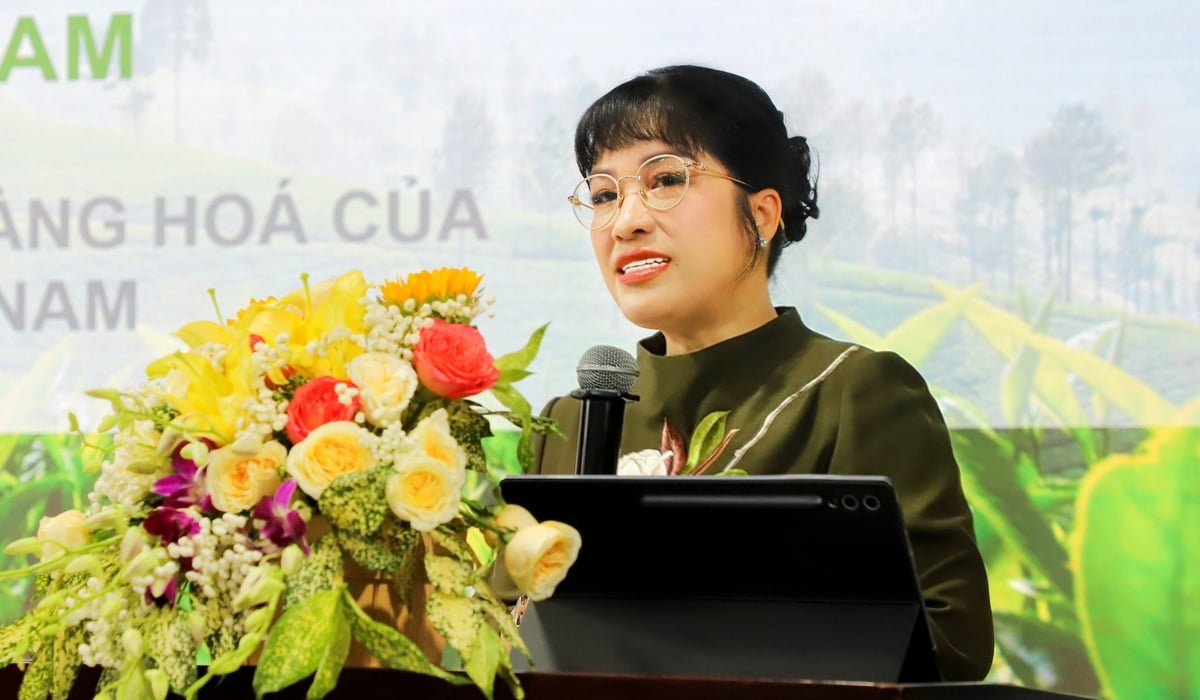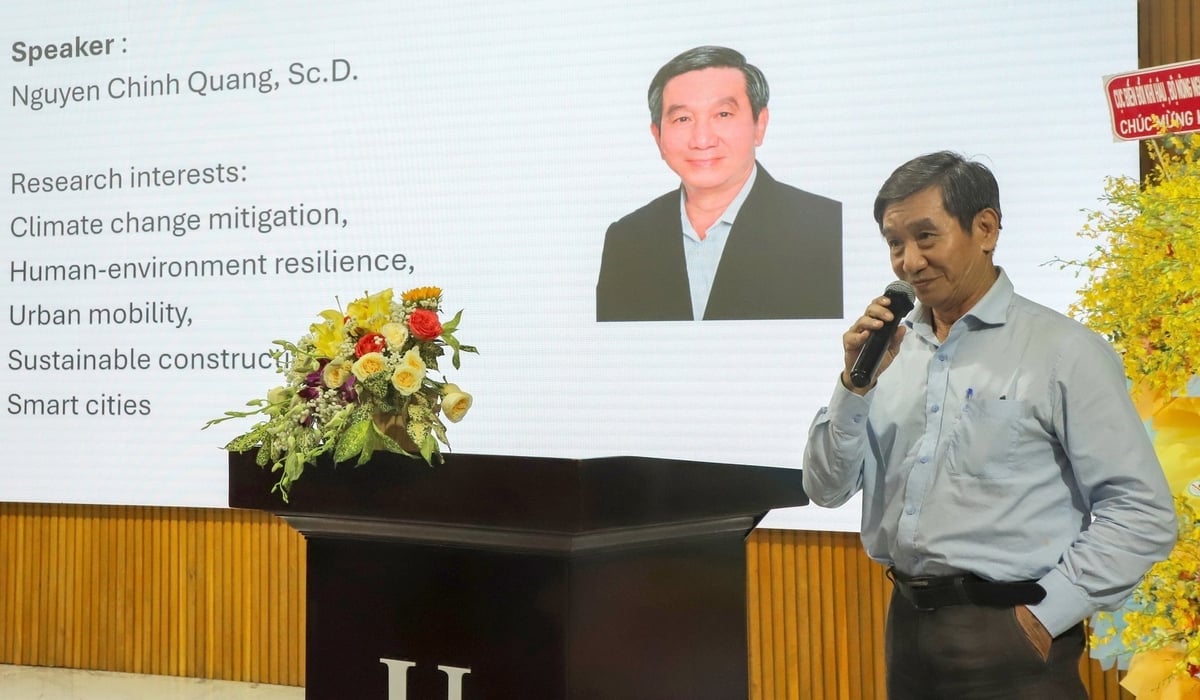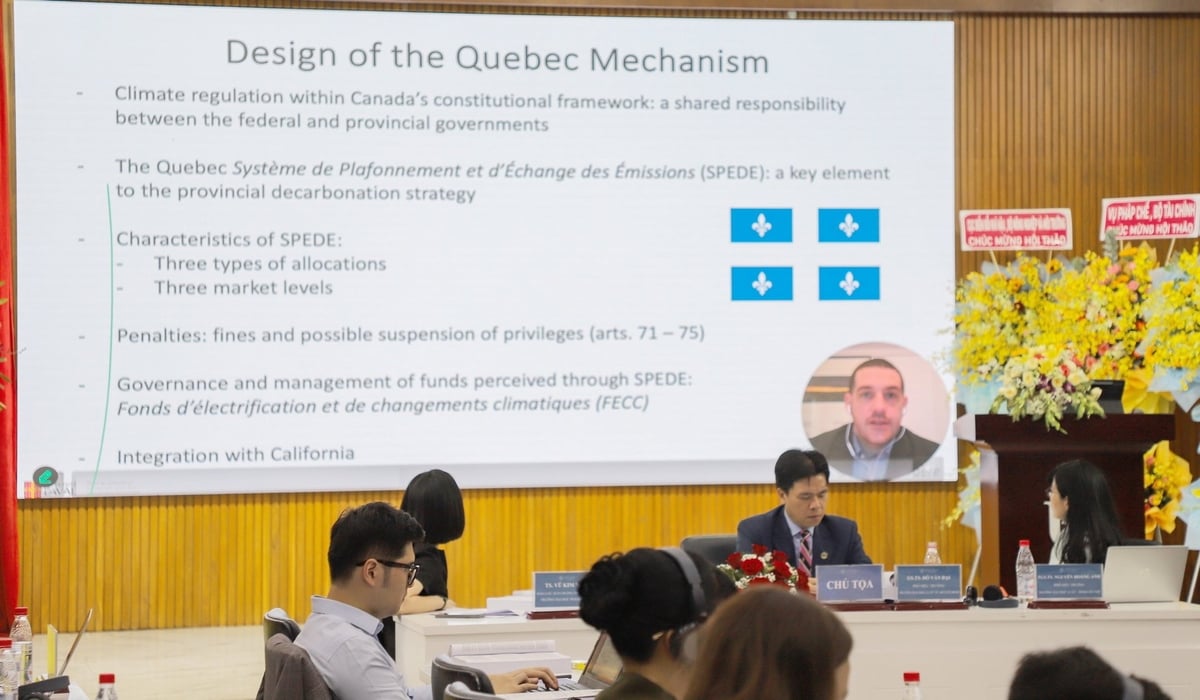December 17, 2025 | 00:35 GMT +7
December 17, 2025 | 00:35 GMT +7
Hotline: 0913.378.918
December 17, 2025 | 00:35 GMT +7
Hotline: 0913.378.918
The event gathers top experts from the United Nations, Russia, the United States, Canada, the European Union, China, Thailand, Australia, Indonesia, and Vietnam to discuss legal and practical issues in building the carbon market in Vietnam.
CEO Luu Thi Thanh Mau, Director General of Phuc Khang Corporation, serves as the keynote speaker and moderator at the international workshop, stating: "Fundamentally, Vietnam's current legal framework has laid the necessary legal foundation for the formation and development of the domestic carbon market, aligning with international trends and Vietnam's obligations under the UN Framework Convention on Climate Change and the Paris Agreement."

CEO Luu Thi Thanh Mau speaking at the Workshop. Photo: Phuc Khang Corporation.
The carbon market is not a conventional commodity market; the legal aspect plays a “pillar” role in building trust and ensuring operability. The workshop focused on the necessity and critical importance of establishing a clear and consistent legal framework for the sustainable development of Vietnam’s carbon market.
A group of authors from James Cook University (Australia) and Ho Chi Minh City University of Law, in their presentation titled “The Carbon Market and Vietnam’s Legal Framework Options for Greenhouse Gas Emission Reduction Measures”, highlighted practical issues related to the carbon market and tax mechanisms within the legal landscape.
While the carbon market offers flexibility and cost-efficiency, its successful implementation requires a well-functioning regulatory framework and market infrastructure. On the other hand, a carbon tax provides price predictability but may impose economic burdens on certain industries. Vietnam’s legal framework needs to strike a balance between these approaches, integrating elements that ensure both environmental effectiveness and economic feasibility.
The authors proposed: “Carbon taxation should be implemented only after the Emissions Trading System (ETS) has been established and is operating stably. Furthermore, a hybrid model combining ETS and carbon tax must clearly define the scope of each mechanism. Clarifying this distinction is essential to avoid double taxation on businesses and to ensure compliance with sustainable development principles.”

Dr. Nguyen Chinh Quang from James Cook University, Australia, presents his paper. Photo: Phuc Khang Corporation.
CEO Luu Thi Thanh Mau also cited existing laws, regulations, and legal frameworks related to the carbon market in Vietnam, such as the Law on Environmental Protection 2020, the Prime Minister's Decision No. 232/QD-TTg dated January 24, 2025, approving the Scheme on the Establishment and Development of the Carbon Market in Vietnam, and Decree No. 06/2022/ND-CP, in her presentation titled "Some Legal Issues on Carbon Market Commodities in Vietnam."
Four key aspects of the legal regulations on greenhouse gas emission quotas and carbon credits were analyzed during the workshop, including: (i) Regulations on the management of carbon credits and greenhouse gas emission quotas; (ii) Regulations and procedures for evaluating and recognizing programs and projects under domestic and international carbon credit exchange and offset mechanisms; (iii) Regulations regarding the competent entities authorized to certify greenhouse gas emission quotas and carbon credits that can be traded on the domestic carbon credit exchange; (iv) Regulations on the auction of greenhouse gas emission quotas.
Legal issues regarding emission quotas and the establishment of carbon credit ownership
One of the most extensively explored and discussed topics at the international workshop was the legal framework surrounding “carbon credits” and “greenhouse gas emission quotas.” The relationship between “carbon credits” and “emission quotas” is built on the Cap-and-Trade mechanism.
In this mechanism, “Cap” refers to the government setting a total allowable limit of greenhouse gas emissions for emitting entities. Each entity is only allowed to emit a certain amount of CO2 or its equivalent. “Trade” allows those who exceed their allocated quota to either pay higher taxes or purchase additional emission allowances.
Through these two components, a country can cap the total amount of CO2 released into the environment. Entities that emit less than their quota can accumulate the unused emissions in the form of carbon credits, which can then be sold or exchanged on the carbon market.

Dr. Charles Codère attending the workshop online. Photo: Phuc Khang Corporation.
At the workshop, Dr. Charles Codère - Head of the Research Program on New Challenges of Economic Globalization at Laval University (Canada) - shared insights on the Cap-and-Trade model applied in the province of Quebec. “Our goal is to provide Vietnamese experts and policymakers with valuable tools and insights during this critical phase of developing a national carbon market,” Dr. Codère stated.
In the presentation “Establishing a Legal Framework for Vietnam’s Carbon Market: Lessons from Indonesia’s Experience,” Associate Professor Dr. Tran Thang Long – Head of the Department of Legal French and lecturer at the Faculty of International Law, Ho Chi Minh City University of Law – and his research team offered four major policy recommendations.
“We propose four strategic recommendations to strengthen the foundation for Vietnam’s carbon trading system: (i) Reclassify carbon credits as securities; (ii) Implement a transparent annual GHG emission quota allocation system with a minimum carbon price; (iii) Introduce additional carbon taxation measures; (iv) Establish recognition protocols for carbon credits issued by international organizations,” said Dr. Tran Thang Long.
From a business perspective, CEO Luu Thi Thanh Mau also offered specific suggestions to contribute to improving the legal framework: “Legal regulations must clearly define carbon (carbon credits, carbon allowances, carbon offsets) as tradable valuable assets, with ownership rights, transferability, and legal protection. A mechanism should be established for certification, registration, and storage of carbon on a national data system to ensure authenticity and transparency. This would reduce transaction costs and ownership uncertainties, encouraging investment and market activity,” she stated.
The international workshop concluded with valuable recommendations for completing the legal corridor for Vietnam’s carbon market in a transparent, efficient, and sustainable direction. Clearly defining ownership rights and strictly regulating emission quotas and carbon credits will lay the foundation for a healthy carbon ecosystem, contributing to building a greener future for Vietnam.
Translated by Kieu Chi

(VAN) Trading forest carbon credits is to reduce greenhouse gas emissions while creating sustainable livelihoods for local communities.

(VAN) Expanding the area of forests with FSC certification creates a foundation for elevating the economic value of forests, promoting sustainable management, and offering opportunities to participate in the carbon credit market.

(VAN) MAE and GIZ organized the conference to strengthening capacity and readiness for EUDR implementation in Vietnam.

(VAN) When women, men, children, and people with disabilities all have the opportunity to maximize their potential, the economy will grow, and the country will prosper.

(VAN) Effective disaster prevention and the creation of sustainable livelihoods through practical forestry policies are the distinct and crucial values of special-use and protection forests.

(VAN) The policy movement regarding carbon emission reduction is opening up a new approach, linking national goals with practical agricultural production.

(VAN) Deputy Prime Minister Tran Hong Ha made this request at the 24th meeting of the National Steering Committee for Combating IUU Fishing with 21 coastal provinces and cities joining virtually.